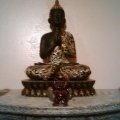Save a Ghost
 Cinorjer
Veteran
Cinorjer
Veteran
I'm sitting here, cup of lemon tea in hand, recuperating from a mild case of flu. I'm feeling particularly nostalgic so I browsed through my bookshelf of past writings. I came across an old story of mine, one of the first ones I wrote with a Buddhist theme, called Master Kwang and the Hungry Ghost. I've posted it here years ago as a gift and if you wish to read what passes for a parable in my mind, go ahead and enjoy. I'll post the link at the end. But tonight, I want to talk about the last koan I worked on with a real Teacher, the one that inspired the story in fact. That koan is: "Save a Ghost."
Now before we begin, let's get something clear. There is no single right or wrong way to "do" koans. They are fascinating study aids and mysterious keys to unlock insight and useless holdovers of a temple hiearchy, all rolled into one. What I'm telling you is one way to look at this koan. This might not be your way, or the way you've been taught we should handle them. That's perfectly fine. Go with it.
Now, a koan that simply says, "Save a Ghost" is plenty mysterious. Say what? Okay, Buddhists are all into that saving all beings thing, but a ghost? How am I supposed to save something that's dead? And save it from what?
So, first step. Deep breath. First thing to realize about koans, every single one of them is about the mind. Is the flag moving or the wind moving? It's not about flags or wind, but the mind moving. So we're not talking about a ghost yelling "Boo!" from the dark closet. We're talking about the mind. The ghost refers to something about our own minds.
What is a ghost? It's something that has died, or been killed, yet refuses to go away. But it's not alive. We ignore it, fear it, don't want it around. "You're dead! Go away. I don't want to deal with you anymore!"
Ah, but now we begin to penetrate the koan. The ghost is in our minds. We all have something, some experience, some emotion or memory that we have decided we don't want to deal with anymore. So we kill it. We refuse to deal with it. As far as we're concerned the issue is dead and buried, the memories forgotten, we've moved on and that nasty business is a thing of the past. But it isn't really. It's a ghost. It pops up when we least expect, refusing to stay properly dead. It haunts us. It is not really a healthy acceptance, is it? Can you think of something in your mind that fits the description?
So how do we save a ghost? We realize it's not a ghost. It's not really dead. In fact, we are the ghost or the ghost is us.
We save the ghost by becoming the ghost. Then it can finally be laid to rest. It's just memories. Part of who we are.
Hope this made you think a bit about your own ghosts and maybe next time you meditate you can say hello to one of them. And now, the story that koan inspired. Everyone enjoy a good ghost story on Christmas!
http://newbuddhist.com/discussion/14373/master-kwang-and-the-hungry-ghost






Comments
Thanks @Cinorjer ...
The koan reminds me of this one ....
"One hour then another.
Inexorably march, step by step
Whenever I meet you, we each smile
But who is it who drags your 'corpse' around?"
'What are the differences between Heaven and Hell?', a young Zen monk asked an aged Buddhist priest who was renowned for his wisdom.
'There are no material differences,' replied the old monk.
'None at all?' asked the puzzled young monk.
'That's right. Both Heaven and Hell have a spacious hall with a big pot in the center in which noodles are boiled, giving off a delicious scent,' said the old priest. 'The size of the huge pan, the number of people sitting around the pot and the bowl of sauce placed in front of each diner are the same in both places.'
'The odd thing is that each diner is given a pair of meter-long chopsticks and must use them to eat the noodles.'
'To eat the noodles, you must hold the chopsticks properly at their ends,' the old monk told the young Zen monk.
'In the case of Hell's kitchen, people are always hungry because no matter how hard they try, they can't get the noodles into their mouths,' said the old priest.
'But isn't it the same case for the people in Heaven?' the junior monk inquired.
'No. They can eat because they each feed the person sitting opposite them at the table. That's the difference between Heaven and Hell,' explained the old monk.
http://www.dpjs.co.uk/litanies/chopsticks.html
I like that one. Yup. I like that one very much. Makes a change from the Angry Samurai Lord's experience. Nice one, @lobster ....
I was sure that's where it was headed until the noodles.
Really good.